Virtual reality admitted for evidence in a Florida court
A man in Florida, Miguel Albisu, is charged with aggravated assault with a deadly weapon in Broward County, Florida. Albisu has entered what is commonly called a “special plea” in most courtrooms. In most situations, a special plea is entered when a defendant claims that their actions are explainable in a reasonable way. A common plea, for example, would be a plea of not guilty or guilty. A special plea would include not guilty by reason of insanity, self defense, imperfect self defense, etc.
A special plea does not dispute the evidence, it disputes the reason why the defendant took the actions that they did.

Albisu is the owner of a wedding venue and preparing to go to trial to face aggravated assault charges. His defense claims that the crowd became intoxicated and uncooperative with staff at the venue. He claims that the act was in self defense to attempt to deescalate the situation.
Anyone who enters a special plea must hit the ground running. Rather than simply questioning the case against them at a trial, an individual who enters a special plea has to put on a compelling case that portrays a very alternate theory to what the prosecution has presented. Typically that is accomplished through expert testimony, witness testimony, mental health testing, etc.
There are many obstacles to climb when it comes to a special defense theory, as there should be. Anyone could, and many attempt to manipulate the justice system by claiming that their actions were justified. One obstacle is perspective, the defense needs to show the jury the perspective of the defendant at the time of the incidient.
To assist with that, Albisu’s defense attorney, Ken Padowitz, has entered into evidence a virtual reality depiction of the incident. In his case, Albisu is trying to convey to the court what the incident was like from his perspective and why he felt he was in a position of needing to defend himself, his family, and his staff at the wedding venue.
Judge Andrew Siegel allowed the evidence to be admitted and reviewed the virtual footage with a Oculus Quest 2 virtual reality headset in court.
